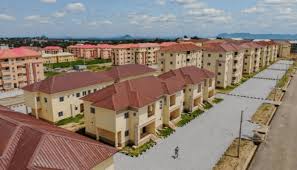Lagos and Ogun States have emerged as Nigeria’s top hotspots for residential property price increases in 2024, displacing Oyo and Anambra, which led the market in 2023. This is according to the latest ‘Property Price Index Report’ released by BuyLetLive, a prominent online real estate marketplace in Nigeria.
The report, which analyses real estate market trends between 2021 and 2024, revealed that Lagos recorded a 39.46% increase in residential property prices, up from 29.89% in 2023. Ogun followed closely with a 30.48% rise, compared to 28.24% last year. These sharp increases highlight a significant shift in market dynamics, especially in Nigeria’s South-West.
BuyLetLive, which aggregates property listings for rent, sale, lease, and short-let, attributed the residential market boom to sustained housing demand, even in the face of rising inflation and declining purchasing power.
The residential segment remains the most active driver of real estate growth, supported by strong urbanisation trends and developer focus on high-end housing. This was corroborated by Northcourt Real Estate, a leading firm in real estate market research, which noted heightened construction activity in major cities like Lagos, Abuja, and Port Harcourt.
“Urbanisation is a leading driver of demand. The desire for urban living remains strong. This is affecting the evolution of cities – turning them into hubs of construction activity,” said Tayo Odunsi, Chairman of Northcourt Real Estate.
Estate Intel, another real estate intelligence platform, also reported a surge in new residential developments in Ikoyi, Lagos’ upscale neighbourhood. According to its CEO Dapo Omidire, around 1,700 new units are currently in the development pipeline, with many projects scheduled for completion between 2025 and 2027.
“Sale prices, rental yields, and the overall competitive environment will be significantly affected by this growing supply,” Omidire said, noting that 20 key developments represent about 40% of the planned new units in the area.
However, analysts have raised concerns about the sustainability of this growth in Lagos, pointing to an alarming 30% residential vacancy rate in Ikoyi, as per unverified reports. They question whether market fundamentals support the volume of ongoing construction, particularly in high-end segments.
According to BuyLetLive’s report, short-let apartments experienced the highest spike, with prices rising from 12.95% in 2023 to a staggering 46.40% in 2024 — an over 200% increase. This sharp rise is attributed to inflation, rising building costs, and the premium associated with short-term rental options in city centres.
In Lagos, investor interest in the residential segment continues to outpace commercial and retail sectors. The report noted that millennials dominate the rental market, while baby boomers lead in property purchases, indicating a generational divide in housing demand patterns.
Ogun State’s performance has also improved significantly, driven by industrial development and urban migration. According to Gbenga Osowe, CEO of BuyLetLive, Ogun is benefiting from an influx of Lagos residents seeking more affordable living options amid rising costs in Nigeria’s commercial capital.
Ogun’s real estate appeal is further boosted by upcoming oil and gas exploration by NNPCL, which is expected to stimulate investment and increase demand for residential and commercial properties around industrial zones.
Though 2023 saw a dip in Ogun’s property activity due to weak consumer spending, the 2024 rebound is notable. Affordable housing is becoming a key focus, as the Federal Government’s ‘Renewed Hope Project’ kicks off with housing projects in multiple states. This has led to increased interest in lower-cost units.
Damilohun Oke, Research Analyst at BuyLetLive, explained that economic headwinds have altered investor behaviour and buyer preferences. “We observed a rise in demand for affordable housing. However, broader challenges like foreign exchange volatility, inflation, and fuel price hikes slowed down real estate activity and impacted construction costs,” he said.
Oke added that despite earlier projections, PropTech funding in Nigeria fell below expectations due to global economic uncertainty. Venture funding dropped to $67 billion, reflecting a 15% fall in value and 30% decline in deal volume globally compared to the same period in 2023.
This challenging economic climate has led to a slowdown in Nigeria’s real estate and construction sectors, contributing less to national GDP than in previous years. Analysts caution that without targeted reforms and infrastructure investment, these positive trends in Lagos and Ogun may face future headwinds.
Still, the current trajectory shows that both states are becoming focal points for property investment, driven by urbanisation, strategic developments, and changing housing preferences.
